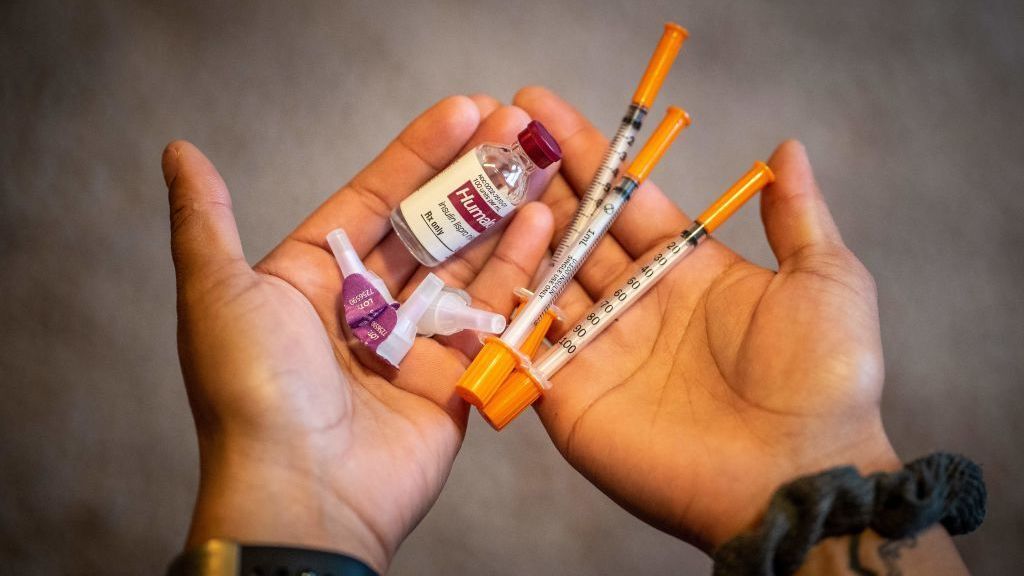[ad_1]
Health care costs – including for things like an insulin kit, for example – can be catastrophic for millions of Americans, even those with health insurance, according to a study.
Kerem Yucel / AFP via Getty Images
hide caption
toggle legend
Kerem Yucel / AFP via Getty Images

Health care costs – including for things like an insulin kit, for example – can be catastrophic for millions of Americans, even those with health insurance, according to a study.
Kerem Yucel / AFP via Getty Images
When it comes to worrying about high healthcare costs, having health insurance doesn’t necessarily save you, according to a study recently published in JAMA.
Despite the gains in insurance coverage brought about by the Affordable Care Act, high health care costs continue to weigh on many Americans, researchers have found. About 11 million Americans suffered “catastrophic medical expenses” in 2017, the last year covered by the study – and private policyholders made up more than half of them.
“Catastrophic spending” is a term coined by the World Health Organization that refers to healthcare spending over 40% of a person’s income after the cost of food and shelter.
During the study period from 2010 to 2017, 6 million people aged 20 to 64 with private insurance suffered such financial burdens, and their share of the total that reported them increased from 46% to around by 54%. The study found an overall decrease in catastrophic spending by 2017 – especially people on Medicaid saw a decrease – but not among private policyholders.
Dr Charles Liu, one of the study’s authors, called the results “surprising”.
Despite the gains in health insurance, he said, many Americans can still be vulnerable to unmanageable bills, including high premiums and high out-of-pocket expenses. He worries, as a doctor, that these costs could discourage people from seeking health care.
“I think it’s going to create a new kind of culture of ‘I’m not going to the doctor because I don’t know what it’s going to cost or I’m afraid it will break the bank’,” he said. he declares. noted.
Liu cited two reasons he thinks people with private insurance don’t have better financial protection against huge expenses: high-deductible plans and inevitable trips to off-grid facilities such as theaters. emergency. These situations can leave patients on the hook for high bills.
“A lot of [employer] insurers offer their employees high deductible plans because healthcare is so expensive, and that’s how businesses can stay afloat, ”Liu said. “Even if you hit your max and owe nothing more than that, that number alone can still represent over 40% of your net income.”
The authors noted that while previous research had shown the benefits of ACA in helping low-income and uninsured groups obtain health coverage, little was known about its impact on high-income earners or on people with disabilities. private insurance through employers or the individual market. This group includes people still at the lower end of the income scale who earn too much to qualify for Medicaid or government grants (i.e. tax credits), which were two fundamental principles of ACA. .
The researchers analyzed the income, insurance coverage, and expense data of a large sample of American adults.
Low-income private policyholders got the worst results from the analysis, seeing no benefit from ACA: 8% for people on Medicaid.
Dr. Martin Gaynor, president of the American Society of Health Economists, noted that Americans with private employer-provided health care “have long borne the burden” of higher health care costs when employers shift. find themselves paying higher premiums for reduced benefits, and as a result, paying lower wages to their employees.
“Some economists believe that higher health care costs are the main reason for stagnant wages for many American workers,” Gaynor said.
The study noted that, thanks to the expansion of ACA’s Medicaid, over 7 million additional Americans enrolled in Medicaid during the study period (14 million were added to Medicaid lists. from 2020). Public insurance has been effective in providing affordable care to eligible individuals and families.
“People who have Medicaid actually have pretty low catastrophic spending rates,” Liu said, explaining that he has strict caps on the amount of fees charged, premiums are generally zero or very low, and spending personal are weak. caps.
Expanding Medicaid in the 12 states that have yet to expand could help provide better protection against medical expenses for certain groups of people, said Dr Ellen Meara, professor of health policy at the TH Chan School of Harvard Public Health.
“In states that have not rolled out Medicaid, there is good evidence that people are falling through the cracks in this direction,” Meara said. “The goal of insurance is to protect us against catastrophic costs, and if more than half of the people facing catastrophic costs are insured privately, I think we still don’t.”
Meara also places prescription drugs at the top of the list of contributors to the financial burdens of all types of insurance, and she expects to see more pressure on elected officials to help change that.
As the Supreme Court considers arguments in a case that could overturn all or part of the Affordable Care Act, President-elect Joe Biden has defended and vowed to try to strengthen and improve the law, saying he is vital to protect the health of Americans. blanket.
Expanding insurance coverage may be just the first step in making health care accessible to many Americans, Liu said. The current health care system, he said, “still leaves a lot of people behind.”
Liu hopes the scrutiny of America’s healthcare system will improve affordability, telling NPR that “we still have a lot of work to do – more reform is needed, more innovative ideas and more support.” .
Kristen Kendrick is a registered family physician in Washington, DC, and a health and media researcher at the NPR and Georgetown University School of Medicine.
[ad_2]

